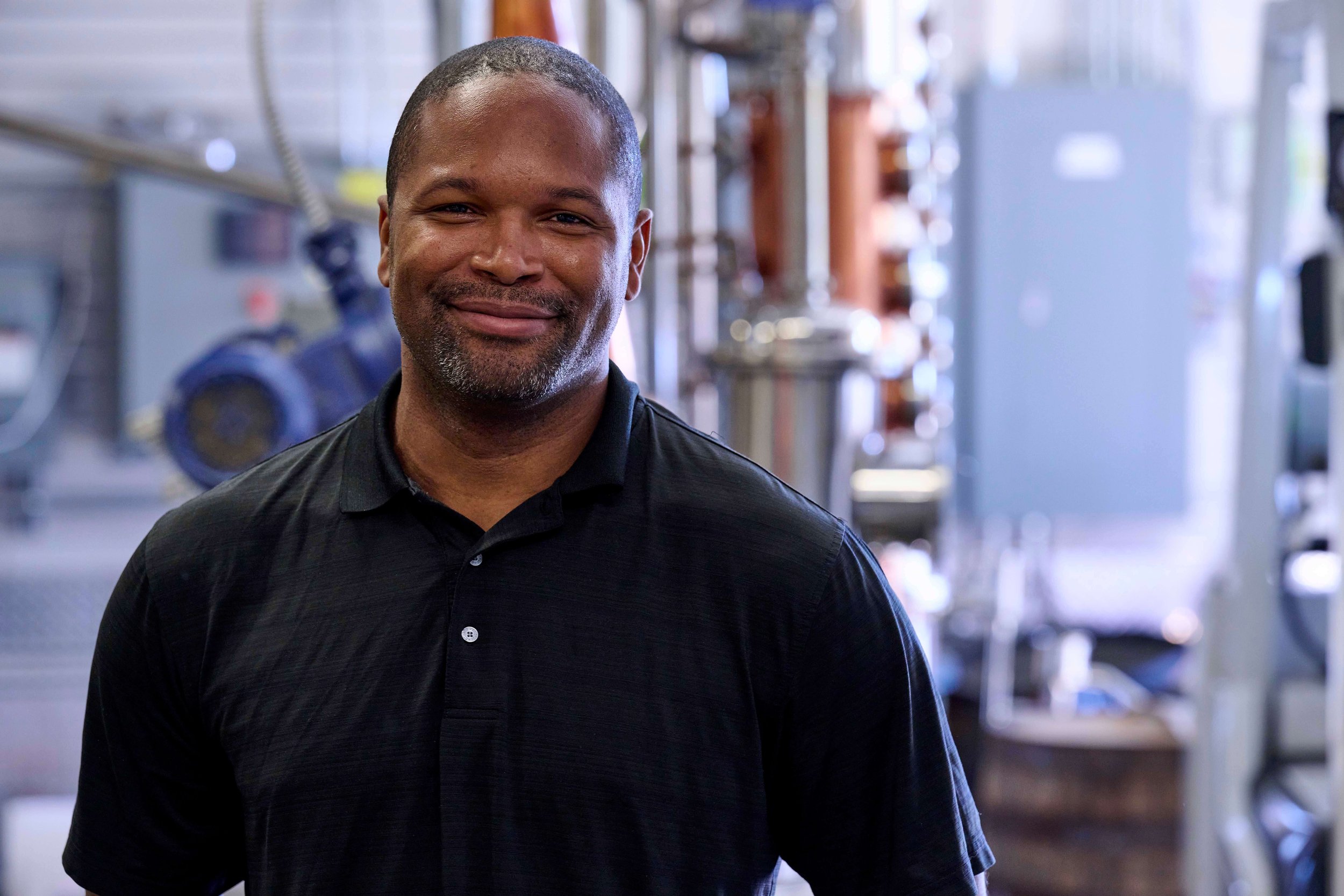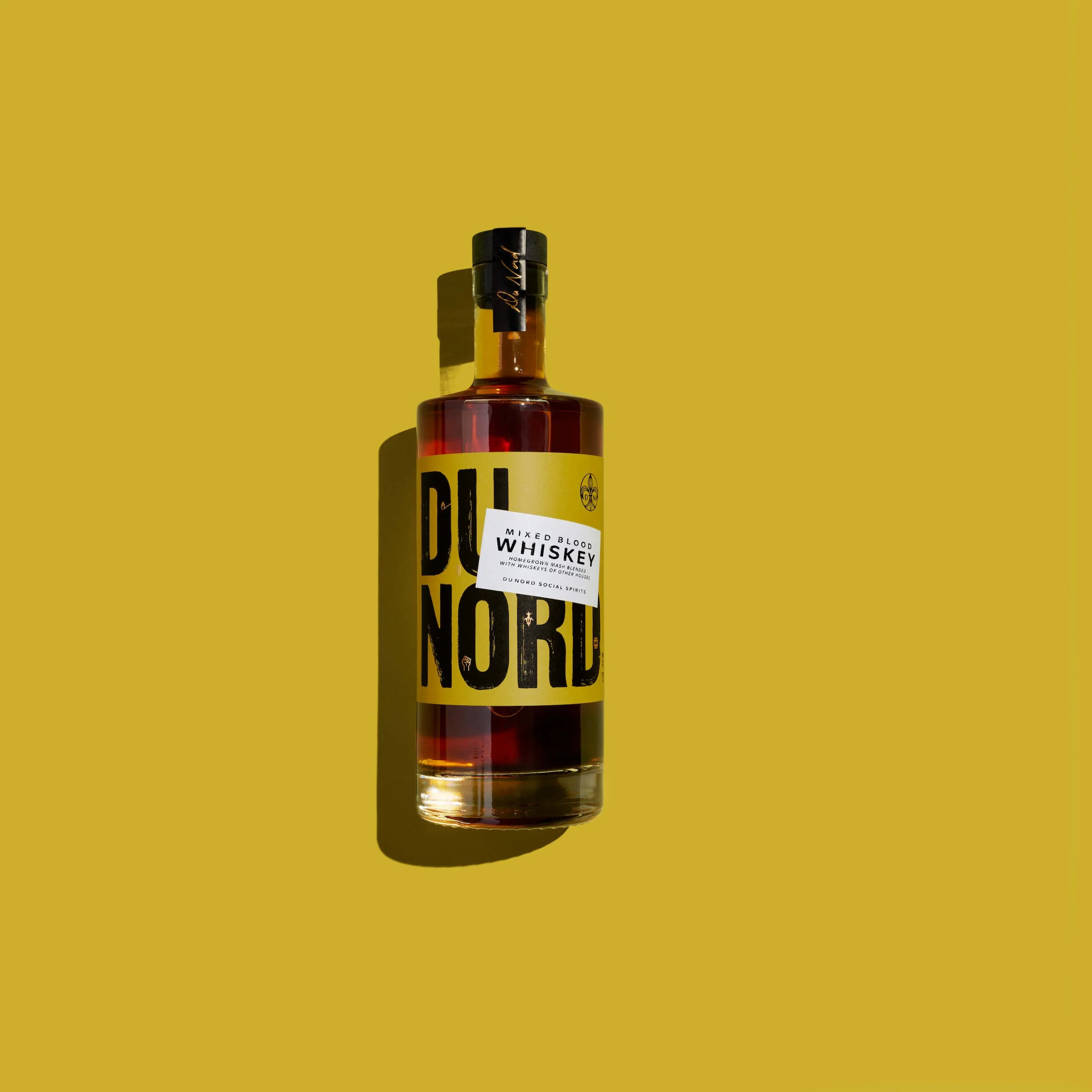Du Nord Social Spirits Founder Chris Montana Shares His Mission
Du Nord Social Spirits is America’s first Black-owned distillery, but that alone isn’t what makes the brand so special. The distillery’s blended whiskey with a touch of rye Mixed Blood won Double Gold at the New York International Spirits Competition and Du Nord’s founder Chris Montana has even more far-reaching ambitions. By using his platform to start the Du Nord Foundation and give back to his local community Chris Montana discovered a social mission that transcends the spirits industry and has transformed his “tiny little distillery in South Minneapolis” into an international brand worth paying close attention to.
We recently caught up with Montana to hear about his experience as America’s first Black distillery owner and how he’s used his position to improve the world around him.
What does being America’s first Black-owned distillery mean to you?
Chris Montana photo credit Ken Friberg
Initially it wasn’t a big deal to me, and it stands as a bit more of an embarrassment nationally than an accomplishment personally. I didn’t do anything unique to accomplish that, I was going to start the distillery one way or another. When we were founded in 2013, think about how many hundreds of distilleries existed then – thousands now – there should have been more [Black-owned distilleries] at that time. I think it stands as a reminder of how much work there was to be done back then as opposed to highlighting anything special about me.
As an industry it should be concerning to us that we made it to 2013 and no other Black people had previously put together a production facility. Prior to me doing this there were other Black people who had influence in the industry and it’s not like Black people weren’t doing work in this industry. So I think the fact that no one got to this point before me can’t be an accident.
You’re right, there’s a rich history of Black people in the spirits industry that has largely gone untold. What are your thoughts on that?
DuNord whiskey photo credit Ken Friberg
I think that you hit the nail on the head; the history is there but it’s untold. Every spirit that this country has been known for has always been made by Black people. Whether it was rum or the people who were making George Washington’s rye whiskey – those were Black people too. We’ve always been there, but it just hasn’t been a large part of the narrative. Even now as we talk about who’s the first to do this or the first to do that it still obscures the fact that there’s this deep history before there was ever a Du Nord Social Spirits. That’s a history that’s worth telling, and I know there are people out there who are trying to get that story out.
Speaking specifically about the Du Nord Social Spirits story, I know the George Floyd demonstrations had a huge impact on you and your distillery. Can you tell us about that?
In the aftermath of those demonstrations the distillery was damaged and we ended up having multiple fires set. That was difficult, I won’t try to sugarcoat that at all, one of the hardest things I’ve ever done is to show up to this business that I’ve put so much time and effort into and to see it literally going up in smoke. But ultimately for us it ended up being a good thing. The national consciousness was jolted and people had to start asking, “what are we doing to support some of these Black-owned businesses and are we doing enough?” Answering those questions has played a part in some of the partnerships that we’ve been able to secure in the past few years, and I can’t ignore that.
It was also a kick in the ass for me because instead of being this quiet Minnesotan who is trying to make change in my own small token way I said, “No, we need to be bolder. We need to get out, and we need to do more.” It became a “put your money where your mouth is” situation which is what continues to give us energy today. Running this distillery has been a very long road and it’s very difficult to keep the energy up over the past 10 years but we got our energy back in 2020 because we saw what we should’ve been doing all along and we got our new mission.
That new mission is the Du Nord Foundation which was born out of that moment, right?
Yes and the foundation was formed kind of by accident. We didn’t intend to start the foundation; we intended to do what we thought needed to be done in that moment which was to get food and supplies to people who couldn’t get them. We also needed to get as much money as we could out to some of these other businesses who didn’t have the same national exposure that we had. We knew that this ecosystem that had supported us was driven by all these other [Black-and-brown-owned] businesses out there and we knew that if we lost that ecosystem then none of us would be successful.
So we set out to raise money and we planned on raising $30,000 but we ended up raising almost $1 million. Then suddenly we had a new problem, which is that the way the fund was setup we couldn’t have the money go directly to Du Nord Social Spirits without being taxed. So to get away from that and use 100% of the money for what it was donated for we created a nonprofit so the money could go to the nonprofit. Then we thought, well, if we’re going to have a nonprofit then maybe it should have a life beyond this moment and maybe we should think about what we could be doing for the future.
So the Du Nord Foundation was born out of supplying relief to people who needed it in that moment and then came the long term goal of supporting Black-and-brown-owned businesses so that in the future we can actually build generational wealth and our community will see ourselves in these commercial corridors. I think if that were true at the time then the outrage would not have been taken out on something that we would see as our own.
So the social mission you’ve started with Du Nord Social Spirits makes your brand special, but what makes your Mixed Blood whiskey special?
Mixed Blood Whiskey photo credit Ken Friberg
I look at Mixed Blood as an approachable whiskey that can be approachable without the compromise. Usually when people talk about a lower proof spirit they think you have to compromise on taste or on mouth feel, but the point of Mixed Blood is that it’s lower proof and accessible but you still get the benefit of flavor. We don’t believe you have to give that up. That was done intentionally so that anyone at the party can enjoy Mixed Blood whiskey.
When it comes to the production part of it, we’re talking about the “cold cook” process which is not something we wanted to do, it’s something we had to do. When Du Nord started we had basically no budget and at the time I was told I could put a boiler in for about $60,000 but as it happens $60,000 was my entire budget. So, because we couldn’t put a boiler in we had to figure out a way to convert complex starches and corn without using heat for gelatinization and the way we got that was by using the cold cook process.
What that means is instead of using heat to make those sugars accessible, we use time. Fermentation in most distilleries might be a few days and ours was well over a week! We would get the mash started and then over time through exposure to the water – which was as hot as we could get it –that water will eventually permeate that corn, and as that happens it becomes available to the enzymes. In cold cooking you are creating the sugars the same time you are fermenting the sugars and it takes a lot of patience. So when you talk about the sweetness and the mouth feel of Mixed Blood whiskey I believe that was developed in part due to the cold cook process.
Finally, what would you like to see for the future of Du Nord Social Spirits?
Du Nord Social Spirits photo credit Ken Friberg
I think we have an opportunity to grow, and the bigger that we can grow with Du Nord the more we can do with the foundation. Like I said before, it’s where we get a lot of our energy. I think there are other areas where we can show up to support culture makers in an authentic way as a Black-owned brand that is using that identity as a platform to bring other people with us.
A lot is being done by the whiskey community to help bring Black brands to the fore – actually a lot more is being done than ever before. There are a number of entry points today that didn’t exist in 2013 and that is a big deal. I am interested in seeing more distilleries owned by Black-and-brown people but to do that you need to address the small business infrastructure that exists today. There are barriers to entry that exist if you want to create something that is capital intensive like a production facility and I think that’s an area where we need to shed a little bit of light.
I have to believe that more Black people would have started up distilleries if it had been accessible to them. What made it inaccessible was not just that they didn’t see themselves in those positions, but it was also the question of, “how are we going to afford it?” Many of us are undercapitalized and though we have over 200 Black-owned brands now, that doesn’t mean they’re going to survive. So in order to have longevity we just need consumers to give us a chance. We’ll be hard at work taking care of the rest.




